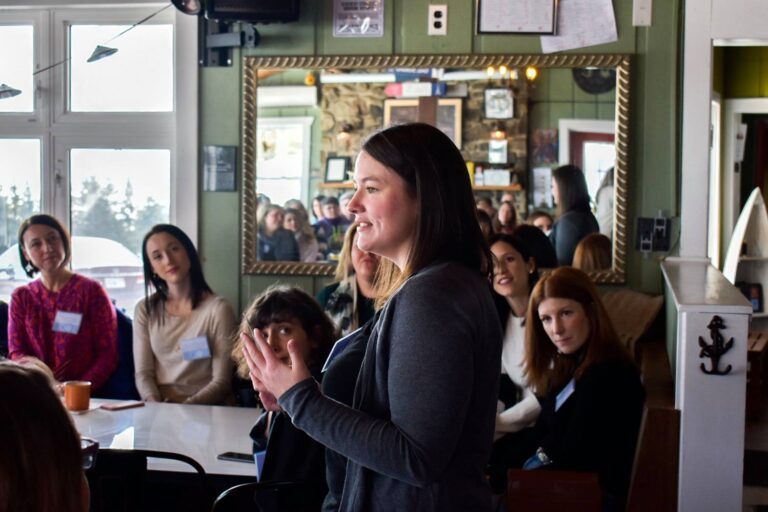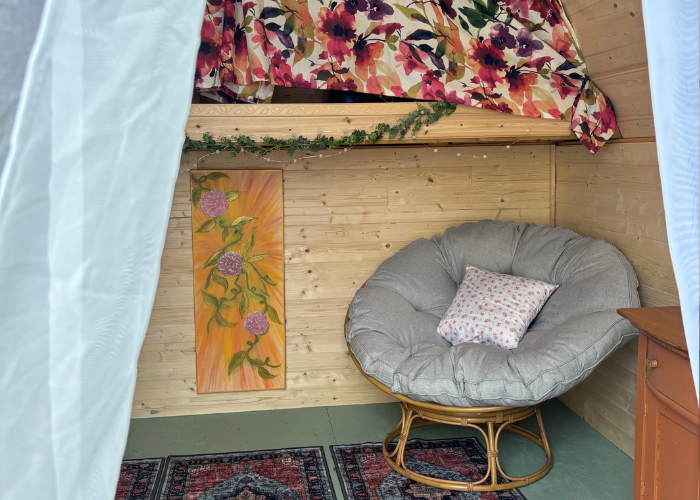How to Really Trust the Process by Trusting Yourself
Trust the process. It’s a loaded saying that I think a lot of people throw around without considering what they’re asking people to do. It’s actually quite difficult to trust a process when you don’t know what the process is. And it’s even more difficult to trust the process when you don’t trust yourself to follow through or take actions that need to be taken to get the desired result.
I’ve just wrapped up the first round of edits on my seventh romance novel and it’s been a struggle for me to get to this point. The story hasn’t gone in the direction I thought it would. The characters have developed a mind of their own. And I haven’t named the damn book yet, which is unusual for me.
I always start my creative projects with a title. So when my inclination was to start telling myself to “trust the process” I had to hit pause. You might be surprised to find I’m a pretty woo-woo kind of person. I totally believe in the magic and influence of the universe. But when it comes to getting things done, I don’t tend to trust the process. I trust the person doing the work instead. Here’s why.

It’s Hard to Trust the Process When You Don’t Know the Process
As a self-published author of six romance novels, you’d think I’d have no trouble sitting down to write any number of other stories. But the truth is that the more time I spend writing romance novels, the more I realize that this isn’t a lather-rinse-repeat kind of process. In fact, each novel I’ve written has taken on a life of its own, which sounds like a made-up thing, but it’s what happens when you’re just trying to get ideas out of your head and onto the page.
I clean the pages up later, of course, but by the time I get to the editing phases, which is where I am right now with my seventh novel, the story is mostly finished. And I usually love where the story has taken me. With this novel, though, I had a hard time trying to contain it in one book. I set myself the goal of writing a stand-alone romance novel.
Recognize and Welcome the Challenge of Creating a New Process
I wanted the challenge knowing that my other novels are longer, more drawn-out story lines. Ironically, it was easier for me to write three novels that intertwine than it has been to write a single story line. This realization has me admitting that the process is not the same as it was when I wrote two trilogies. And I think a part of me assumed that “different” meant “harder”. Therefore, I think I’ve made the process harder on myself than it needed to be. At the same time, it is the truth: it’s a different process to write one story than it is to write three stories, and I’ve had to learn how to do that all over again.
What makes this so interesting is that there was a time in my life when I absolutely would have given up writing this novel because it wasn’t turning out to be the same experience I had not once, but twice, while writing two romance trilogies. I wrote the first set of books and before they were published and for sale, I’d started writing the very next set of books.
Being Honest is Better Than Being Right
I developed a process for writing a trilogy and it was difficult for me to imagine writing a stand-alone story after finishing the second trilogy. But of course, that made me want to do it even more. I was hoping to find that I was wrong, of course. I wanted to get into writing a stand-alone romance novel and find that it was, in fact, no different from writing a trilogy. Much to my dismay, I was wrong, which meant I was actually right based on my original assumption.
Discovering that I was both wrong and right about what it was going to take to write a stand-alone romance novel meant I put off finishing the damn thing for a while. It also meant I needed to be honest about what is was going to take to finish it: I didn’t have to trust the process. I had to learn the process. I had to create the process. And I had to use the process. Which effectively meant, this was on me instead of the process.
It’s Hard to Trust the Process When You Don’t Know the Outcome
One of the reasons I think it’s been so hard for me to sit down and actually write this novel is that I didn’t give it a title. I know that sounds like an insignificant detail, but my creative process has always started with a title, or at the very least, a guiding idea. The interesting thing about novel writing is that your story line can go off the rails in no time. Of course, depending on who you are and what direction that story line has taken, it could be a good or bad thing. Truthfully, there’s no bad story lines.
There’s only more or less work depending on how closely you stuck to your title or guiding idea. That’s how I think of it anyway and what has worked for me in the past. But with this novel? My story line not only went way off the rails, I’d completely forgotten what I was supposed to be writing about around chapter six and took the entire thing in a different direction. Why? Who knows? It felt right.
Maybe I was being a bit lazy with the story arc because I knew I could change it later. I don’t have a good reason for why I got so far away from the original idea except to say that it’s because I didn’t know the outcome I was looking for.
Patience is Part of the Process and the Outcome
When I sit down to write a novel, I recognize that it’s not going to happen in a day. I write fast and I write a lot in one sitting, but I also like to give ideas time to stew and see what other options might exist for them. I don’t just do this in novel writing: I do it in a lot of areas of my life. More so, now than ever, if I’m being honest. But I also recognize that there are two outcomes I’m looking for when I sit down to write a novel.
For starters, I’m simply looking to finish the damn book. I think anyone who has ever set out to write a novel or even a non-fiction book (I’ve written several of those as well), knows that the first goal is just to get your ideas onto the page: finish the damn book.
But the second outcome is not always so clear: do you want to instill a certain feeling in your readers along the way? Are you just looking to reach a certain word count? Do you want to set the story up to be a trilogy? Do you want this become a series? It’s never as simple as saying, “I finished a book.” The book always lives on in a second capacity, whether that’s in itself or outside of itself.
What’s the Second Outcome?
And beyond “finish the book”, I think some people struggle with that second outcome. I certainly did this time around. Because I’d decided it was a stand-lone story, I felt boxed into what I had to work with. Of course, there are no real rules to writing romance novels. Sure, there are popular ways of writing, but no rules, really.
So why I felt like I needed to create a boundary for myself and my writing is still something I’m working on, but my best guess at this point is that I didn’t lock onto that second outcome. I was “trusting the process” to write a book because I know how to put words on paper, but didn’t really get clear on what those words were going to say.
The Process is About More Than the Word Count
An interesting dynamic arose while I was writing this romance novel: I kept worrying about the length of it. That’s never happened to me before, especially as someone who writes run-on sentences like they are the reason to live. I tend to be wordy, and am a natural over-sharing kind of person, even in my writing. So I was surprised to find I was struggling not only to see where this novel was going to go, but how long it was going to take to get there.
For example, the first few chapters of the novel were all over the place in terms of word count. The prologue clocked in over 2000 words, while the first three chapters were just over 1000 words each and chapter 4 came in under 1000 words. As I was ending chapters after 3 or 4 pages, I was actively worrying that there wasn’t enough meat on the stick, so to speak. I imagined I’d have to go back and write even more later. But in the interest of “trusting the process” I figured I’d have to figure that out when the time came.
I Don’t Let Myself Down. I Won’t Let My Process Down.
I should have known that my gift of gab wouldn’t let me down because when I finished my first round of edits, the book totalled over 53,000 words in total. It’s less than half of the total word count of my other novels, each of which come in closer to 100,000 words, but they didn’t start out there. I had to go back and look at my drafts for The Blurred Lines Series and The Selfish Love Series to confirm my suspicions.
I’ve already talked about the fact that The Blurred Lines Series started out as a terrible stand-alone novel that I re-worked and re-wrote to create a trilogy. A part of me hoped the same thing would happen with this seventh novel, but I did my best to keep it to one story line and stick to it. The goal was to write one book that could hold its own. So when I went back to my drafts, I was surprised and delighted to find that the original drafts, even after I’d broken the original stand-alone story into three, were much shorter than I remembered.
Confirm What You Know to Build Trust
This is the part of “trusting the process” that people refer to, but can’t quite nail down, I think. I was doubting my own work and had to confirm for myself that I had, in fact, figured out the word count issues. And at the same time, the word count isn’t an issue. Remember how I said there are no rules for writing romance novels? Sure, there are “rules”, but like, I don’t have to subscribe to them. I’m self-published.
If I were going to take this stand-alone novel to a traditional publisher, I’d probably have to do a lot more work. To be clear, the work is not what I am trying to avoid. I’m actually trying to retain control over my work. My fear is that if I turn my work over to someone else, they’ll make it something else. And I think a story knows when it’s finished. I wouldn’t want someone to tell me it needs to end differently or it needs to be shorter or longer. The word count is a logistical consideration, not an outcome.
Learning to Trust Yourself More Than The Process
If there’s one thing I’ve learned in writing and self-publishing six (and soon, seven) romance novels, it’s that the process is more like a mirror. Writing a novel, or taking on any creative project, for that matter, is like holding up your thoughts, values, ideas, insecurities, dreams and fears to a mirror and hoping it reflects something better back to you.
It’s been an interesting time for me to write this novel as I’ve been going through a lot of personal and professional transformation and to stow away into a fictional world for a while should have been a needed refuge for me. But it only caused to create more reflection and more desire to not only trust the process of giving myself time and space, but to actually trust myself.
There’s Always Room for Improvement
Have I written a really bad novel? I have no idea. But it’s not finished yet. And writing a good novel, you’ll notice, was never the outcome I was looking for. I trust the process of sitting down to write because I know what happens to me when I write: I learn, grow, expand, and transform, even in a fictional world. In the real world, I’m posing questions to myself about my own life, pulling learning from experiences I’ve had, and rewriting conversations I wish had gone in a different way.
Ironically, much of those pieces don’t make it into my final books. Writing romance novels becomes therapeutic for me because it gives me an opportunity to work with ideas, values and fears in a safe space. I never have to do or change anything about what I learn through my characters, but I learn, nonetheless.
Because I am not afraid of what I might learn, I continue to show up. Showing up, as it turns out, has been the number one way for me to trust myself to know it’s okay to move forward. I can’t break anything as a writer. I get to build something amazing for other people to experience, and I get to experience it myself, to take what I need from it before anyone else gets their hands on it to take what they need from it.
The Process Changes Because We Change
And I think, if we all showed up a little more with the intention of learning from even our smuttiest writing projects, we’d feel more comfortable trusting the process. Because it turns out that we are the process. And the process changes as much as we do.
If you’re interested in exploring your own creativity and building trust in your own body of creative work, consider joining my 5-Day Creative Challenge. You’ll give yourself a little bit of time and space to have ideas just for the sake of having them so you can build that trust with yourself. When you trust yourself, you can step into your life as much as you want because you know you’ll always have your own back.





